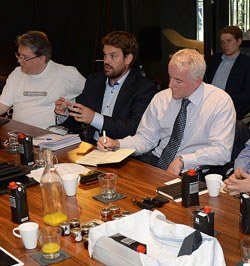Author Note: This is a guest post by Nick Hyner, director of Cloud Services for EMEA at Dell
 On 12th June, we held a cloud roundtable event in London. The aim was to facilitate a relaxed discussion around the question ‘Can cloud power the future UK tech economy?’ looking at the opportunities that cloud computing offers UK businesses.
On 12th June, we held a cloud roundtable event in London. The aim was to facilitate a relaxed discussion around the question ‘Can cloud power the future UK tech economy?’ looking at the opportunities that cloud computing offers UK businesses.
The roundtable moderator, analyst William Fellows from 451 Research, kicked things off by sharing some stats for the cloud market showing that the UK’s uptake of the technology has been slow. The US is the biggest player by far, accounting for 61 percent of the global spend on cloud with EMEA accounting for just 22 percent.
These facts laid the groundwork perfectly for the discussion – it began with a look at the benefits cloud offers businesses.
“From a small startup, our own infrastructure could be set up very quickly in the cloud, without having to spend lots on hardware,” explained Steve Edkins, CEO of FusionExperience.
Cloud not only gives the ability to set up networks and systems quickly and easily – it also gives flexibility and control as well offering startups “immense scalability and processing power,” added Siddharth Singh, head of programmes at Pivotal Innovations. The participants focused in on examples of businesses that have used cloud particularly well, such as startups that are offering an alternative to the traditional banking model, and others that are disrupting the taxi industry using the technology.
Given the incredible power that cloud brings, it’s surprising that uptake in the UK has been slow; perhaps in some sectors, people simply aren’t ready for change.
“In some of the large banks, or in the public sector, it’s believed that the best practice is previous practice…There is so much to harness, but you need to get the people on side first,” remarked Mark O’Conor, UK manager partner at DLA Piper.
For established businesses with lots of entrenched infrastructure, moving to the cloud may be too difficult. As freelance journalist Simon Bisson pointed out, “[These businesses have] huge amounts of data on premise. It’s simply too hard and expensive to move…”
Within the organisation, other factors like regulation, security or even company politics can slow the process down – the CIO will have different requirements to the CMO, for example, and all these needs have to be met within one solution. There lots of rules around data storage, so particular industries such as banking and finance need to consider compliance. This bureaucratic process often delays matters and approvals can be slow.
Security is another important consideration for any business; whichever solution is chosen has to be hacker-proof. But attitudes to security vary from country to country in line with different legislation.
“I’ve spoken to a number of Finnish companies [for example] which recognise that getting good services and reliability goes above and beyond the worry around privacy from the NSA,” said Don Smith, director of technology, Dell SecureWorks.
The answer, therefore, may be to offer flexible cloud services – “locally, regionally or globally” in line with regulation, added Nick Hyner, director of cloud services EMEA, Dell.
The participants chatted briefly about how companies are influenced in their cloud buying decisions – suggesting that peer review is becoming increasingly important, particularly for startups. The discussion concluded by proposing that in order to make more money from cloud in the UK, perhaps all we need is to become better at promoting our businesses, particularly online.
“We have lots of great British success stories…We need better visibility in the UK and also to hold onto the success stories we have,” argued Phil Wainewright from Diginomica.
“We’re big believers in London as having the ability to become an EU hub. But London can’t be everything,” concluded Siddharth Singh, head of programmes at Pivotal Innovations.
So perhaps we simply need to be mindful of what London’s strengths are and capitalise on them.
******************
 Nick Hyner is Director of Cloud Services for EMEA at Dell, responsible for all aspects of the business in Europe, Middle East and Africa. Nick’s background is varied and previous roles at Dell include, Head of Partners for Dell and EMEA Services Legal Counsel, where his responsibilities covered all legal aspects of Dell’s cloud computing business and responsibility for launch of a range of Dell branded, and acquisition led related cloud services. Nick is a regular speaker at cloud focused events and also contributes to a number of industry articles and white papers linked to the cloud marketplace. Earlier in his career, Nick worked in the technology venture capital and private equity industries as a tech focussed corporate finance adviser for Cobalt Corporate Finance and a lawyer at Clifford Chance.
Nick Hyner is Director of Cloud Services for EMEA at Dell, responsible for all aspects of the business in Europe, Middle East and Africa. Nick’s background is varied and previous roles at Dell include, Head of Partners for Dell and EMEA Services Legal Counsel, where his responsibilities covered all legal aspects of Dell’s cloud computing business and responsibility for launch of a range of Dell branded, and acquisition led related cloud services. Nick is a regular speaker at cloud focused events and also contributes to a number of industry articles and white papers linked to the cloud marketplace. Earlier in his career, Nick worked in the technology venture capital and private equity industries as a tech focussed corporate finance adviser for Cobalt Corporate Finance and a lawyer at Clifford Chance.
